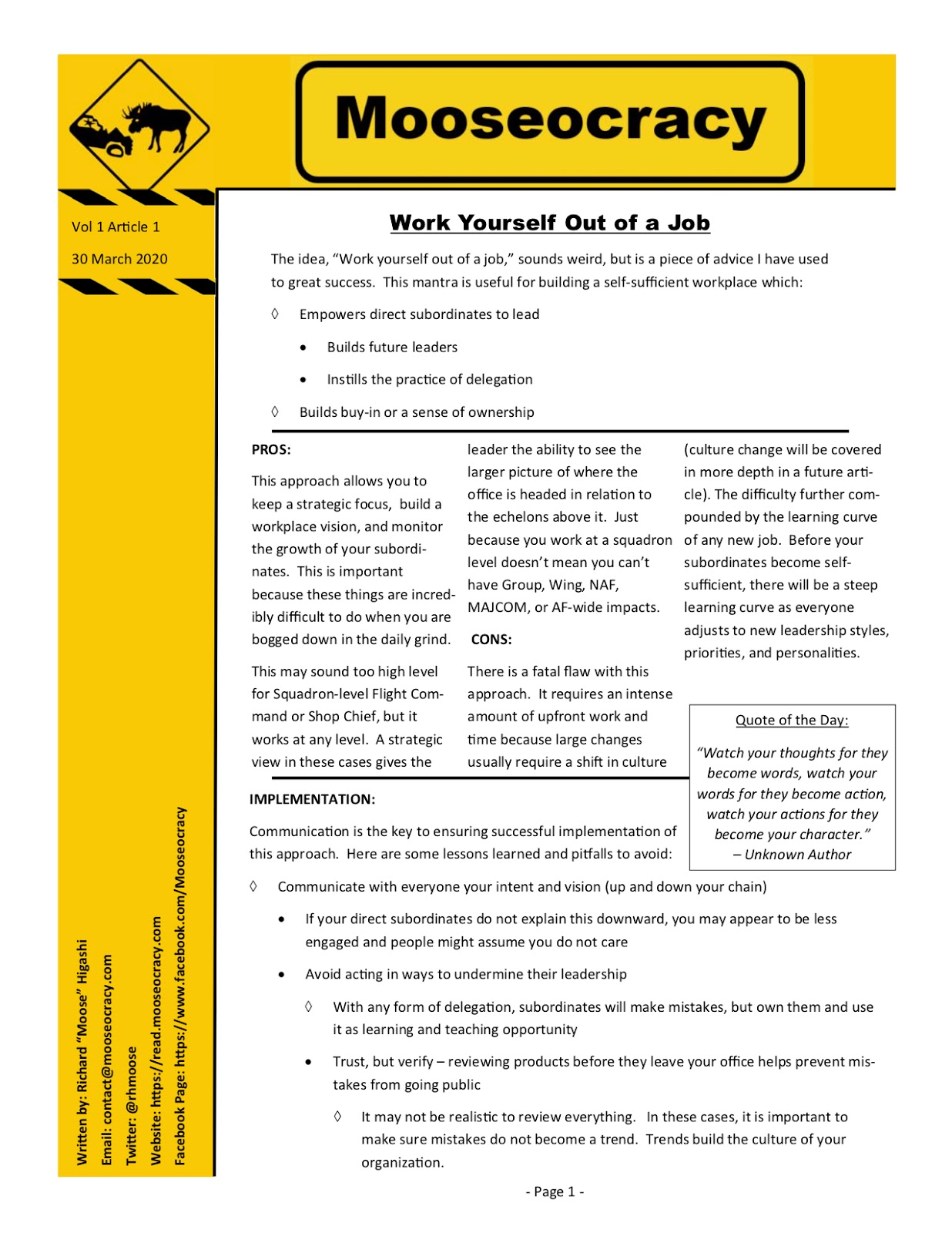Work Yourself Out of a Job
Work Yourself Out of a Job
The idea, “Work yourself out of a job,” sounds weird, but is a piece of advice I have used to great success. This mantra is useful for building a self‐sufficient workplace which:- Empowers direct subordinates to lead
- Builds future leaders
- Instills the practice of delegation
- Builds buy‐in or a sense of ownership
PROS:
This approach allows you to keep a strategic focus, build a workplace vision, and monitor the growth of your subordinates. This is important because these things are incredibly difficult to do when you are bogged down in the daily grind.This may sound too high level for Squadron‐level Flight Command or Shop Chief, but it works at any level. A strategic view in these cases gives the leader the ability to see the larger picture of where the office is headed in relation to the echelons above it. Just because you work at a squadron level doesn’t mean you can’t have Group, Wing, NAF, MAJCOM, or AF‐wide impacts.
CONS:
There is a fatal flaw with this approach. It requires an intense amount of upfront work and time because large changes usually require a shift in culture (culture change will be covered in more depth in a future article).The difficulty is further compounded by the learning curve of any new job. Before your subordinates become self‐sufficient, there will be a steep learning curve as everyone adjusts to new leadership styles, priorities, and personalities.
IMPLEMENTATION:
Communication is the key to ensuring successful implementation of this approach. Here are some lessons learned and pitfalls to avoid:- Communicate with everyone your intent and vision (up and down your chain)
- If your direct subordinates do not explain this downward, you may appear to be less engaged and people might assume you do not care
- Avoid acting in ways to undermine their leadership
- With any form of delegation, subordinates will make mistakes, but own them and use it as learning and teaching opportunity
- Trust, but verify – reviewing products before they leave your office helps prevent mistakes from going public
- It may not be realistic to review everything. In these cases, it is important to make sure mistakes do not become a trend. Trends build the culture of your organization.
- As mentioned earlier, there will be a steep initial curve with this approach
- As Greg Blom said in LaaD Podcast #4, understand your purpose (both personal and organizational)
- On day one, you have all the responsibility and are the expert
- Get in the books – understand your organizational purpose
- Build personal / organizational goals and vision
- Understand your subordinates – conduct feedback
CONCLUSION:
The earlier in your career you practice this, the more benefits it will reap as you progress in
rank. Because the higher you go, the more evident it will be that this is necessary. Some
talented individuals may find it faster or more efficient to do things themselves, but
eventually there will be a day when you can’t do everything yourself. If you are not naturally
talented (like me) then practicing this approach will help you build a self-sufficient workplace.





All the other corporations starting doing the identical thing, quickly as} again flooding the market, in order 온라인카지노 that the odd cartoony or sci fi theme now stand out from the remainder. In this fashion, themes and artwork styles come and go, but all the time with a finger on the heart beat|the heartbeat} of the latest trends. Like Pavlov's dogs, players learn to hear for these sounds and search for these results in anticipation of a great award. They'll keep coming back to game to recreate that have in hopes or repeating their win or getting a much better win.
ReplyDelete